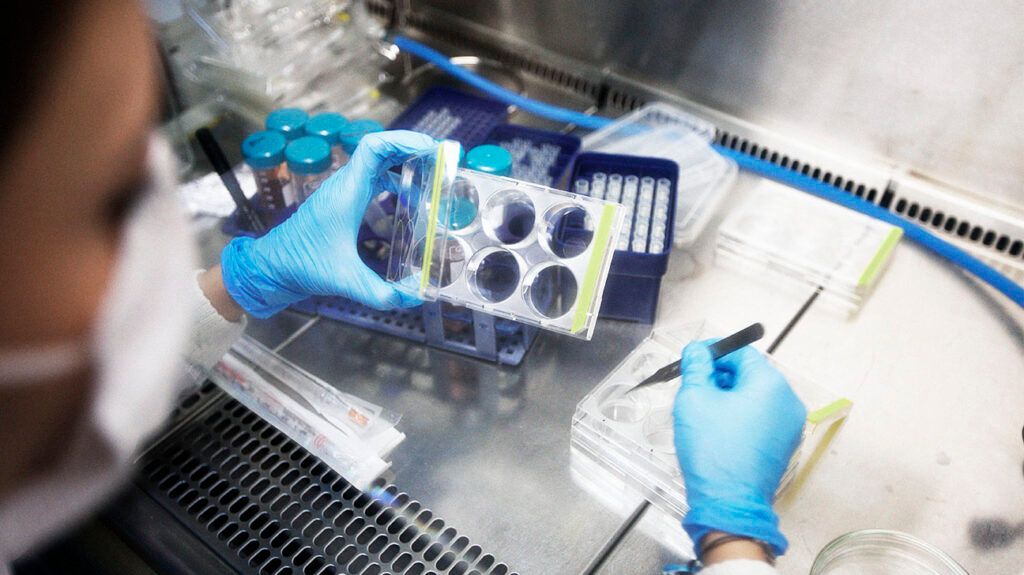Herpes is an infection that results from one of two types of herpes simplex virus. Herpes can hide in the nerve cells for a long time before activating, which makes finding a cure challenging. There is currently no cure, but research on vaccines is ongoing.
Most people with herpes do not show symptoms, but the infection can also cause painful ulcers and blisters. Those without symptoms can still pass the infection to others.
Herpes simplex virus 1 (HSV-1) typically causes oral herpes but may also cause genital herpes. People transmit HSV-1 through saliva.
Herpes simplex virus 2 (HSV-2) is a more common cause of genital herpes. A person might acquire HSV-2 through genitalia to genitalia contact, genitalia to mouth contact, or other forms of sexual contact.
This article reviews the reasons there is no cure for herpes, the progress on developing a cure, and the current treatment options.

Herpes is a common infection. According to the
There is currently
Researchers have conducted several clinical trials investigating vaccines against herpes infection, but no commercially available vaccine is currently available.
Herpes is challenging to cure because of the nature of the virus. The HSV virus can
Experts suggest that even if antiviral drugs destroy the active parts of the virus, it only takes a small amount of the virus to hide in the nerve cells and become dormant for the herpes virus to continue persisting in the body.
To find a treatment, scientists need to understand further the mechanism that enables the infection to hide. By learning more about this mechanism, they might be able to develop treatments to target latent HSV and even work toward a function cure.
Some medications may reduce the frequency and severity of symptoms and lower the chances of passing the infection on to others. Current antiviral medications to treat herpes include:
- acyclovir
- valacyclovir (Valtrex)
- famciclovir (Famvir)
Any of the above medications can be the
For people with severe infections or compromised immune systems, the doctor may prescribe intravenous (IV) medications to control the infection.
People with high levels of stress or trauma may experience more frequent recurrences of herpes. In this case, a doctor may advise psychotherapy and counseling.
A person can transmit HSV-1 when they have no symptoms. However, they are most contagious during an outbreak.
People with an HSV-2 infection can transmit genital herpes while experiencing no symptoms. HSV-2 is most contagious during an outbreak of sores.
People
Pregnant people with symptoms of genital herpes should speak with a healthcare professional, as there is a risk of neonatal herpes.
Neonatal herpes is where a pregnant person passes the infection on to their fetus before, during, or immediately after delivery. It
The
Clinical trials are underway to search for an effective treatment. A new drug called pritelivir is currently undergoing clinical trials as a treatment for herpes symptoms. Experts believe pritelivir may be a useful alternative for people who cannot take acyclovir.
Scientists are
The researchers expressed hope that current developments of the mRNA vaccines due to COVID-19 may help in finding a solution sooner.
The following sections provide answers to frequently asked questions about herpes.
Is herpes contagious forever?
Herpes is a lifelong infection that has periods of flares or outbreaks and remission. A person can pass herpes to their partner at any time, though they
Is there any hope for a cure for herpes?
Medication has come a long way in helping to suppress herpes, and a cure may be possible in the future. According to a 2020 study looking at the effect of adeno-associated virus (AAV)-delivered meganucleases on mice, researchers were able to eliminate
How do I know if I have herpes?
Symptoms typically appear within
In some cases, a person may not realize they have it. However, if they experience any symptoms related to herpes, they should ask all of their recent sexual partners if they have or may have oral or genital herpes.
If an infection is possible, a person should consider seeing their doctor for diagnosis and testing.
HSV causes herpes and can affect the mouth or genitals. There is currently no cure for the virus, but treatments exist that can reduce the symptoms and infectiousness of the virus.
Scientists are researching vaccines or compounds that might cure herpes. However, there currently is no vaccine that can help prevent the spread of herpes, so a person should use appropriate protection and precautions when engaging in sexual activity with others.
